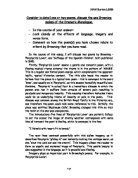What merit can you find in Browning's two poems?
November 2001
Rachel Downes 11P
Browning's two poems, 'My Last Duchess' and 'Porphyria's Lover', have a main similarity. They are both telling a tale about how two lovers killed their lovers. But the differences are rather few and far between after that. In 'My Last Duchess' the man killed his wife because he was jealous of her kind ad friendly persona. But in 'Porphyria's Lover' he is having an affair with this woman and he kills her because he loves her and he wants her to be his forever. Although these poems on the surface look like they aren't just evil poems, which shouldn't be read by children studying for exams because they just contain evil and therefore the poems are not useful. But if you scratch the surface you can realise that this is not true and there is a lot in the poems that is beneficial for the learning and understanding of poetry.
'My Last Duchess' is a poem about self- love. The man s in love with himself and his wife is friendly and kind and he thinks that she is not grateful of what he has given to her and that any gift is ranked with the same value as his. 'She thanked men, -good! But thanked somehow - I know not how - as if she ranked my gift of a nine-hundred-years-old name with anybody's gift.' He is very egoistic and it is rather ironic that Browning used heroic couplets for the poem! Heroic couplets are when the rhyming couplets are in iambic pentameter. This is because iambic pentameter is about the pace in which we speak, and the poem is written as in a monologue in which he is talking to somebody and showing him his picture of his late wife in his art gallery. He makes the iambic pentameter couplets seem more like a conversation and makes it informal by asking is listener question. ' How shall I say?' who'd stoop to blame this sort of trifling?' 'But who passed without much the same smile?' We know that it was a man that he was showing around because in the poem he states: 'Sir, 'twas all one!' We find out later in the poem that the man is an envoy of the Count, who's daughter the Duke wishes to marry next. He makes his wife out to be abnormal, but he only thinks this because she is not agreeing with him so therefore she must be not right in the head. But now that he has killed her he has complete control over her, 'I gave commands; then all smiles stopped together.' As if he has now stopped the miles so he can live easy because he knows for certain now that the Duchess is not being unfaithful behind his back.
November 2001
Rachel Downes 11P
Browning's two poems, 'My Last Duchess' and 'Porphyria's Lover', have a main similarity. They are both telling a tale about how two lovers killed their lovers. But the differences are rather few and far between after that. In 'My Last Duchess' the man killed his wife because he was jealous of her kind ad friendly persona. But in 'Porphyria's Lover' he is having an affair with this woman and he kills her because he loves her and he wants her to be his forever. Although these poems on the surface look like they aren't just evil poems, which shouldn't be read by children studying for exams because they just contain evil and therefore the poems are not useful. But if you scratch the surface you can realise that this is not true and there is a lot in the poems that is beneficial for the learning and understanding of poetry.
'My Last Duchess' is a poem about self- love. The man s in love with himself and his wife is friendly and kind and he thinks that she is not grateful of what he has given to her and that any gift is ranked with the same value as his. 'She thanked men, -good! But thanked somehow - I know not how - as if she ranked my gift of a nine-hundred-years-old name with anybody's gift.' He is very egoistic and it is rather ironic that Browning used heroic couplets for the poem! Heroic couplets are when the rhyming couplets are in iambic pentameter. This is because iambic pentameter is about the pace in which we speak, and the poem is written as in a monologue in which he is talking to somebody and showing him his picture of his late wife in his art gallery. He makes the iambic pentameter couplets seem more like a conversation and makes it informal by asking is listener question. ' How shall I say?' who'd stoop to blame this sort of trifling?' 'But who passed without much the same smile?' We know that it was a man that he was showing around because in the poem he states: 'Sir, 'twas all one!' We find out later in the poem that the man is an envoy of the Count, who's daughter the Duke wishes to marry next. He makes his wife out to be abnormal, but he only thinks this because she is not agreeing with him so therefore she must be not right in the head. But now that he has killed her he has complete control over her, 'I gave commands; then all smiles stopped together.' As if he has now stopped the miles so he can live easy because he knows for certain now that the Duchess is not being unfaithful behind his back.







